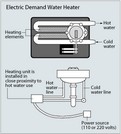Tankless Water Heater a Wise Investment
by Bill and Kevin Burnett, Inman News
 Q: I read with interest your recent column on water heaters. Mine went out recently, and I have been considering going to a tankless model. Since it would cost about three times more than a conventional heater, I was wondering what you thought about tankless heaters? Is it a smart way to go?
Q: I read with interest your recent column on water heaters. Mine went out recently, and I have been considering going to a tankless model. Since it would cost about three times more than a conventional heater, I was wondering what you thought about tankless heaters? Is it a smart way to go?
A: A tankless or “on-demand” water heater simultaneously provides unlimited hot water to sinks, showers and dishwashers. Any man who has endured a cold shower after his teenage daughter drained the tank doesn’t have to ask if this is a smart way to go.
The question gave us pause to consider the way Americans have provided domestic hot water for the past century. Filling a 30- to 50-gallon steel tank with cold water, slowly heating it with a flame or electricity and letting it sit and re-heat until we needed it just isn’t the best way to go. Granted, there are boilers and the odd tankless system out there, but tanks have been the norm for as long as we can remember.
Tankless water heaters are commonplace in Europe and Asia where they became the choice more than half a century ago. Energy limitations and space constraints compelled people to adopt more efficient ways to heat their water. In the United States, homes were large and energy was abundant. There was no pressing need to replace the standard water heater.
Demand water heaters do not store hot water. When a tap is turned on, a gas burner or an electric coil heats the cold water entering the unit as it passes through a series of coils. The amount of hot water delivered is determined by the flow rate of the unit. A higher flow rate allows a greater volume of water to be heated from “cold” (say around 50 degrees) to hot (say around 120 degrees).
Increased volume of hot water allows more fixtures to be served simultaneously. Since water is heated as it is used, a tankless heater is more energy-efficient than a traditional storage tank water heater. According to the United States Department of Energy, in homes that use 41 gallons or less of hot water daily, demand water heaters can be 24 percent to 34 percent more energy efficient than conventional storage tank water heaters. They can be 8 percent to 14 percent more energy efficient for homes that use a lot of hot water — about 86 gallons per day.
For more from the Department of Energy, go here.
A tankless unit delivers an unlimited amount of hot water, provided demand is not too great. In theory, depending on the capacity of the heater, taking a shower and running the hot water in a sink will allow the hot water to gush forever. But add a washing machine to the mix and the increased volume may reduce the hot water to one of the other fixtures to an unacceptable level.
Most gas-fired tankless units can provide up to 5 gallons of heated water per minute. When deciding which tankless heater to purchase, it is critical to keep hot water use in mind. It’s important to determine the number of fixtures that typically will require hot water at the same time. Each fixture will have its own demands.
On-demand water heaters cost more — two to three times that of a conventional water heater — but they can pay dividends in the future. Many tankless water heaters have a life expectancy of more than 20 years. They also have easily replaceable parts that extend their life by many more years. In contrast, storage water heaters last 10 to 15 years.
To answer your question, we do think that going tankless is smart. But with a caveat. Do your homework. Make sure that the unit you purchase is sized right for your usage. We can’t think of anything more irritating than to plunk $1,500-$2,000 down and the thing doesn’t produce for you.
What’s your opinion? Leave your comments below or send a letter to the editor. To contact the writer, click the byline at the top of the story.
Copyright 2009 Bill and Kevin Burnett
See Bill and Kevin Burnett’s feature Telltale Signs Water Heater, Furnace Will Soon Die.
American Apartment Owners Association offers discounts on products and services for landlords related to your real estate investment including REAL ESTATE FORMS, tenant debt collection, tenant background checks, insurance and financing. Find out more at http://www.joinaaoa.org/
To subscribe to our blog, click here.















 Accessibility
Accessibility